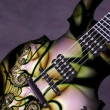"A central point of Maslow's theory is that most people are motivated by their needs systematically, beginning with the basic physiological needs and then continuing up the hierarchy."
G. A. Cole (Management In Theory And Practice)
Maslow's motivational model is based on the principle that we have a hierarchical system of needs with the most basic at the bottom and higher needs at the top. The want to satisfy these needs gives rise to the motivation to do it. Now admittedly this is an extremely simplistic way of viewing the human mind, however it does have particular relevance to musicians.
In my last article I suggested that it was difficult to focus our creative energies if all hell was breaking loose around us and Malsow's principle also supports this idea. If we are hungry or homeless our mental faculties will not be geared towards symphonic compositions. Safety needs again illustrate the same idea, Basically we need a roof over our head and a stable environment in which to function. Love needs could be related to the infamous Zappa idea that the guitarist always gets the blow job, it is, in fact the sole reason that many of us become musicians. Esteem from our peers is also a large part of the reason why we play guitar, perhaps being able to play a particular lick or solo makes us feel more socially accomplished. Most importantly, musicians have a need for self-fulfilment. We need to think that we have accomplished something with our music, that we have actually achieved some of our goals (as carnal as some of them may be).
If we understand in more detail why we pick up that little electric friend, then our goals will be easier to achieve. I sometimes believe my main fault to be my tunnel vision -- it is very hard to look at the big picture when you are continually obsessed with what you are doing at the time.
Appendix on Improvisational Momentum
I've often thought that the main reason for a guitarist to study Jazz is to get more momentum into his or her playing. In Bop, for instance, its main momentum based function is the åSwing', this constant feel of pushing the beat that keeps the piece moving along. Listen to Charlie Parker or John Scofield -- even with little or no backing they still produce a coherent harmonic structure behind their soloing. This is also due to the fact that they understand where the strong tones of a chord lie when they are soloing over it. It is the same reason why jazz players can cope with a key change every half bar. Simply working out the key of a piece then steam rolling over the changes is simply not enough.
A excellent exercise is to record a vamp on one or two chords, not necessarily from the same key. Let's say we take Dm7 / / / Ebm7 / / / (repeat), firstly only solo, with the notes of the arpeggios of both chords.
Learn each arrpeggio on every position on the neck so that you can then solo over the changes with only those notes.
Next add the notes of each Dorian mode to each arpeggio.
However when you are doing this, still pay particular attention to the notes of each arpeggio -- remember, they are the strong tones of the chords. We can also see that between the two chords there are only two common tones (F and C). These notes can be used to lead between each of the chords giving a smooth transition. A common mistake is to wait for the changes then play rather than playing through the changes. Another good tip is to change keys early rather than late as this gives you the change to resolve any tensions.
Check out "Impressions" by John Coltrane or "So What" by Miles Davis as they both use this chord sequence.
Scottish guitarist Gerry Magee has recently completed work on his debut solo album, entitled "The Middle Pillar". He has been teaching guitar privately for five years to students of all styles and abilities.
Prior to recording "The Middle Pillar", Gerry performed as a guitarist and composer for the group Serenade on their second release, "The 28th Parallel".
